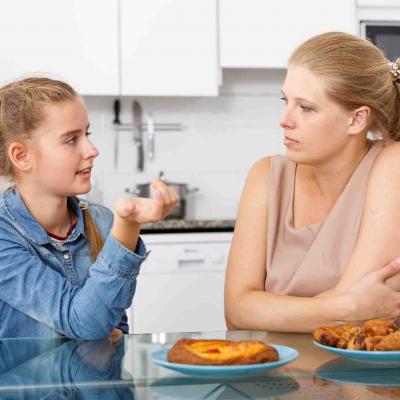At Life Ed Queensland, we believe that preparing every Queensland child to be ready for the world begins with open, honest, and age-appropriate conversations about relationships, puberty, reproduction, and sexual health.
As a parent, your influence is pivotal in shaping your child’s understanding and attitudes toward these topics. Engaging in these discussions not only reinforces the messages they receive through our programs but also fosters a supportive environment where they feel comfortable seeking guidance.
Children are entering puberty earlier, with the average age between 10 and 12 years. Early discussions can:

To effectively support your child, here are some easy steps to prepare yourself to navigate sometimes uncomfortable conversations.
Stuck on how to approach conversations about sexual health with your child? Try to keep the conversation casual and maintain eye contact where possible. Try to use cues around you such as the television, friends or other media to prompt or extend discussions. Use your own experiences to highlight key points and don’t forget to ask your child their view on topics and explain your values to them as appropriate.
Is there anything simple about talking to your child about sexual health? Perhaps not, but endeavour to repeat the question back to your child to clarify what they want to know. Give a simple, clear and factual answer and check that your child has understood what you have told them by asking them to explain it to you in their own words. Ask them if they would like any other information, or if they have other questions. Don’t be surprised if you have to repeat your answer several times! Remember these concepts are new and may take some time for your child to understand.
More complex questions need a similar approach to simple questions. Start by clarifying the question your child has asked to make sure you understand what it is they want to know. Ask your child what they already know about the topic before answering. This will tell you where to start your answer and inform you as to how much detail to give at this stage. Give your child factual answers and keep the tone of the conversation positive. Be sure to take the opportunity to correct any misinformation. Explain that views on the topic you are discussing may vary and try to set your own boundaries. If you feel something is not right, seek additional help.
Remember that you do not need to be an expert! Don’t be afraid to say ‘I don’t know!’, this will give you the opportunity for you and your child to find out together. Try to avoid criticising or judging your child and try not to react with anger. Don’t interrupt your child when they are speaking – it is important for their learning journey to articulate their questions and ideas. If you feel uncomfortable, admit it to your child! It’s better to talk uncomfortably than to avoid the topic entirely. Your child will probably be grateful they are not the only ones feeling uncomfortable!
Talk About It encourages children to communicate with safe adults about personal development. Here are some additional topics that you may want to consider discussing with your child in future:
You can access additional information and resources to support you and your child during this important time.
Raising Children – Talking with children about sexuality
Talk soon. Talk often. A guide for parents talking to their kids about sex
True (Family Planning Queensland) – Puberty for Parents
Family Planning Victoria – Puberty Fact Sheets
Family Planning NSW – Tips for parents
True (Family Planning Queensland) – Sexual Behaviours in Children
Better Health Channel – Parenting Through Puberty
Better Health Channel – Talking to children with intellectual disabilities about sex
A suggested reading list on these and other topics, is available for download via the link below.
Download Reading List